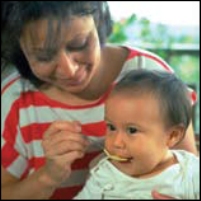Infant nutrition
 Proper infant and young child feeding is of fundamental importance for human survival, growth, development, health and nutrition. The role of proper feeding of infants and young children over the first two to three years of life is crucial, because this age period is a critical time for organ growth, development and metabolic programming, with windows of opportunity that may be irreversibly closed once it has passed. Around 50% of deaths in children under five in the WHO Eastern Mediterranean Region are attributable to mild to moderate malnutrition.
Proper infant and young child feeding is of fundamental importance for human survival, growth, development, health and nutrition. The role of proper feeding of infants and young children over the first two to three years of life is crucial, because this age period is a critical time for organ growth, development and metabolic programming, with windows of opportunity that may be irreversibly closed once it has passed. Around 50% of deaths in children under five in the WHO Eastern Mediterranean Region are attributable to mild to moderate malnutrition.
The vast global burden of malnutrition in its major forms is telling evidence of failed infant feeding worldwide. Inappropriate feeding practices may account for around a third of all cases of malnutrition, depending on population, place, time and season, and in combination with other causes such as infection and food shortage. The WHO Regional Strategy on Nutrition (2010–2019) seeks to improve the nutritional status of the population, particularly in early life, by preventing and treating malnutrition among pregnant women and children aged up to two years.
Information resources
Recent publications
Facts for life (Fourth edition)
Indicators for assessing infant and young child feeding practices: Part 2 measurement
Indicators for assessing infant and young child feeding practices: Part 3 country profiles
Policy documents
Regional strategy on nutrition 2010–2019 and plan of action [pdf 2Mb]
Links
World Food Programme (WFP): Nutrition for mothers and young children


